Bearing the Cross
The Rev. Daniel Berrigan, whose funeral was held Friday in New York, exemplified the radical call of the Christian Gospels to defy the laws of the state for the laws of God. If we seek salvation, for our nation and for ourselves, we must find his courage and his faith.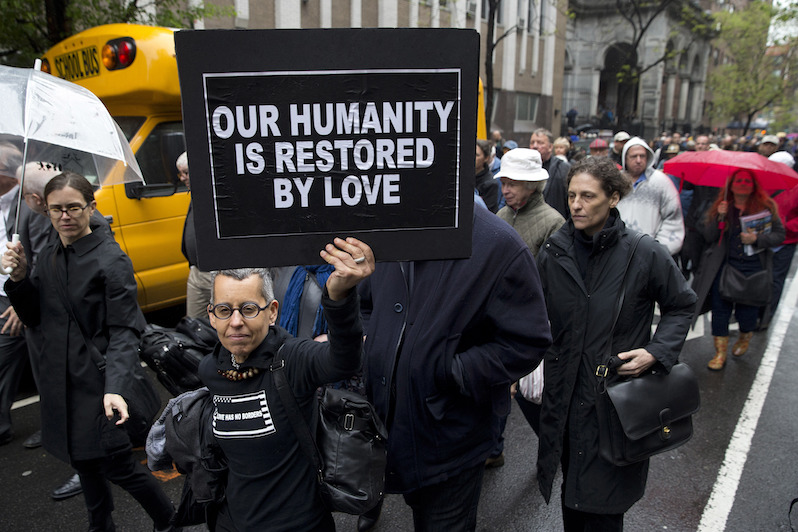 1
2
1
2

Mourners follow the hearse carrying the casket of the Rev. Daniel Berrigan during a procession after his funeral service at the Church of St. Francis Xavier on Friday in New York City. Berrigan, a Roman Catholic priest and peace activist since the Vietnam War, died April 30 at 94. (Mary Altaffer / AP)
Our apologies good friends for the fracture of good order the burning of paper instead of children the angering of the orderlies in the front parlor of the charnel house We could not so help us God do otherwise For we are sick at heart Our hearts give us no rest for thinking of the Land of Burning Children … We say: Killing is disorder life and gentleness and community and unselfishness is the only order we recognize … How long must the world’s resources be raped in the service of legalized murder? When at what point will you say no to this war? We have chosen to say with the gift of our liberty if necessary our lives: the violence stops here the death stops here the suppression of the truth stops here this war stops here …The 2,000 mourners erupted in a prolonged standing ovation. Dan—whose 50 books of poetry, essays and Scripture commentaries, as well as his play, “The Trial of the Catonsville Nine,” are as important a contribution as his activism—was the bête noire of senior church officials, including the archbishop of New York, Cardinal Francis Spellman. FBI Director J. Edgar Hoover, who loathed the peace activists, fabricated a case accusing the Berrigan brothers of conspiring to blow up tunnels under federal buildings in Washington, D.C., and kidnap Richard Nixon’s national security adviser, Henry Kissinger. Dan, who took part in the Freedom Rides and civil rights marches in the South, was in and out of jail all his life. With seven other activists, he illegally entered a General Electric nuclear missile plant in King of Prussia, Pa., in 1980. They poured blood and hammered the fragile cones of Mark-12A warheads. He had been, by the time he died a few days short of his 95th birthday, arrested hundreds of times. This, he said, was the cost of discipleship. “But what of the price of peace?” he asked in his book “No Bars to Manhood.”
I think of the good, decent, peace-loving people I have known by the thousands, and I wonder. How many of them are so afflicted with the wasting disease of normalcy that, even as they declare for the peace, their hands reach out with an instinctive spasm … in the direction of their comforts, their home, their security, their income, their future, their plans—that five-year plan of studies, that ten-year plan of professional status, that twenty-year plan of family growth and unity, that fifty-year plan of decent life and honorable natural demise. “Of course, let us have the peace,” we cry, “but at the same time let us have normalcy, let us lose nothing, let our lives stand intact, let us know neither prison nor ill repute nor disruption of ties.” And because we must encompass this and protect that, and because at all costs—at all costs—our hopes must march on schedule, and because it is unheard of that in the name of peace a sword should fall, disjoining that fine and cunning web that our lives have woven, because it is unheard of that good men should suffer injustice or families be sundered or good repute be lost—because of this we cry peace and cry peace, and there is no peace. There is no peace because there are no peacemakers. There are no makers of peace because the making of peace is at least as costly as the making of war—at least as exigent, at least as disruptive, at least as liable to bring disgrace and prison and death in its wake.Bearing the cross is not about the pursuit of happiness. It does not embrace the illusion of inevitable human progress. It is not about achieving wealth, celebrity or power. It entails sacrifice. It is about our neighbor. The organs of state security—in Dan’s case, the FBI—monitor and harass you. They amass huge files on your activities. They disrupt your life. And in Friday’s homily, the Rev. Stephen Kelly, evoking laughter, welcomed the FBI agents who had been “assigned here today to validate that it is Daniel Berrigan’s funeral mass so they can complete and perhaps close their files.” Your support is crucial...
As we navigate an uncertain 2025, with a new administration questioning press freedoms, the risks are clear: our ability to report freely is under threat.
Your tax-deductible donation enables us to dig deeper, delivering fearless investigative reporting and analysis that exposes the reality beneath the headlines — without compromise.
Now is the time to take action. Stand with our courageous journalists. Donate today to protect a free press, uphold democracy and uncover the stories that need to be told.

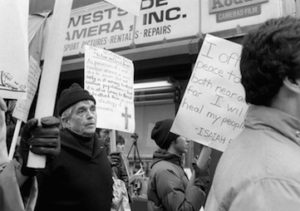
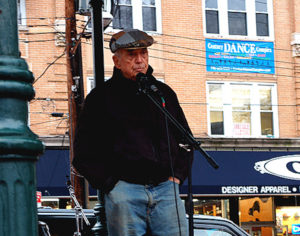
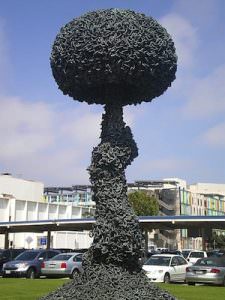
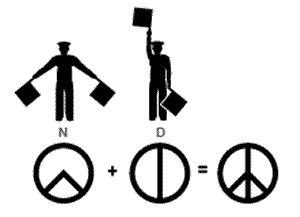
You need to be a supporter to comment.
There are currently no responses to this article.
Be the first to respond.